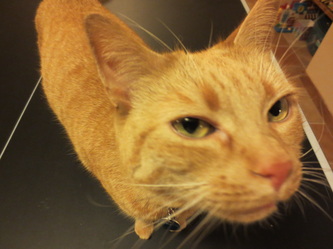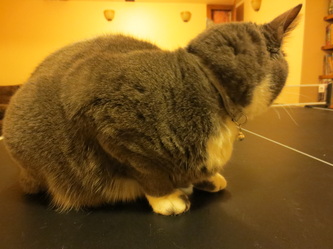This picture is of a small portion of laundry that I was folding this morning, and I was reminded of how I used to do this. First I would dump the laundry on the bed. Then I would let it marinate for awhile. Then it would be bedtime, so I’d have to scoop it back into the basket. (Jim calls this activity “exercising the laundry.”) Then it might go back and forth a couple more times. Then I’d go through it and sort it out into everyone’s pile. Then, and only then, would I finally fold it all up and put it away. What a waste of time! At some point I realized that all I really needed to do was to just start folding and put the things in piles as I folded them. Huh. What a concept. If you have a job you don’t want to do, why add extra steps to make it even harder? But that’s what (some of us) weird humans do. Pretty silly!
“This Is the Saddest Story . . . “
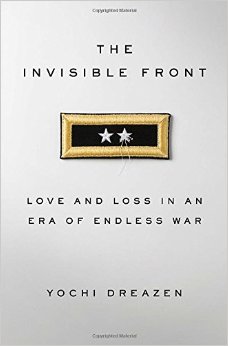 The Invisible Front: Love and Loss in an Era of Endless War by Yochi Dreazen, Crown Publishers, 2014.
The Invisible Front: Love and Loss in an Era of Endless War by Yochi Dreazen, Crown Publishers, 2014.
If you’re a fan of early 20th-Century fiction (or if you’ve taken college-level literature classes), you probably recognized the title of this post as being the first line of Ford Maddox Ford’s novel The Good Soldier. This book is indeed beyond sad: the story of a military family, the father a two-star general, who lose two sons: one to suicide and one to battle. It caught my eye on the new books shelf at the library, and I checked it out thinking that I probably wouldn’t read much of it since it would be unbearable. What pulled me along was the quality of the writing: Dreazen is a well-respected military journalist, and he tells this story without any attempt to wring tears from his readers, which he doesn’t have to do anyway. The story speaks for itself. He is able to bring many voices into his narrative; people were astonishingly open with him.
“The Lord Doesn’t Change My Feelings
. . . u ntil I obey Him” (Rosaria Butterfield’s book, discussed on the previous post). I discuss this idea of the connection between our feelings and our actions in chapter two, “How Our Emotions Work” of my book. It’s very true that the main source of our feelings is our thoughts: “As [a man] thinketh in his heart, so is he” (Prov. 22:7 KJV). But where do the thoughts come from? They seem to arise spontaneously most of the time, don’t they?
ntil I obey Him” (Rosaria Butterfield’s book, discussed on the previous post). I discuss this idea of the connection between our feelings and our actions in chapter two, “How Our Emotions Work” of my book. It’s very true that the main source of our feelings is our thoughts: “As [a man] thinketh in his heart, so is he” (Prov. 22:7 KJV). But where do the thoughts come from? They seem to arise spontaneously most of the time, don’t they?
Those who say that we are just products of chance and our entire mental processes are therefore chemical reactions would then have to go on and say that our thoughts are simply random.
The Great Secret to Happiness . . .
. . . is to like what you have. As in, for me, cats. Three of them. I am NOT a cat person. (I’m obviously also not much of a photographer–but I’m working on it. The middle photo, of the gray cat Smoggy, isn’t really a mistake so much as a reflection of her general personality.) I am a DOG person. I get this sappy grin on my face at the sight of a dog, any dog. I miss my darling little long-haired Chihuahua Lupita, who died several years ago. But, for various reasons having to do with expense, convenience, and life’s vicissitudes, I don’t have a dog right now. I could walk into the Denver Dumb Friends League tomorrow and get a dog on the spot, and believe me, I’m periodically tempted. But then I think of housebreaking, and walks, and how much easier it is to get a petsitter for three cats than for one dog, and I resist the temptation. I tell the cats all the time, “I love you guys, but you’re not dogs.” But hey, guess what? They’re what I have. So there it is. I can pine over the “not dogs” part, or rejoice in the “I love you guys” part.
Life Lessons from a 21-Year-Old
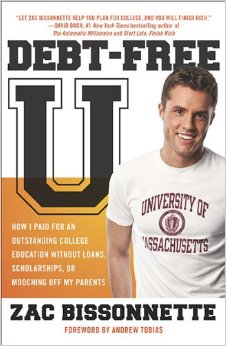 Debt-Free U: How I Paid for an Outstanding College Education Without Loans, Scholarships, or Mooching Off My Parents by Zac Bissonnette, Portfolio/Penguin 2010.
Debt-Free U: How I Paid for an Outstanding College Education Without Loans, Scholarships, or Mooching Off My Parents by Zac Bissonnette, Portfolio/Penguin 2010.
Even if you have no kids going to college, or you’re not a kid planning to go to college, you should read this book. (But you should also read it if you do fit into one of those categories.)
A couple of posts ago I wrote about Dinner: the Playbook, and I said that book wasn’t valuable so much for the recipes or the specific information about planning meals as it was in promoting a general outlook that says: “What can I do right now?” A proactive approach. Well, this is the same type of book, in that it contains principles that go far beyond making sound economic choices when it comes to college.
The Start of Tabloid Politics
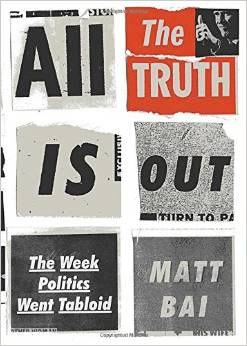 All the Truth Is Out: The Week Politics Went Tabloid by Matt Bai, Alfred A Knopf, 2014.
All the Truth Is Out: The Week Politics Went Tabloid by Matt Bai, Alfred A Knopf, 2014.
Yet another NPR-publicized book. If you’re of a certain age, the name “Gary Hart” conjures up one image, and one image only: of the smiling, mop-haired man in a “Monkey Business Crew” t-shirt with the beautiful woman on his lap. And that’s it. When that one picture hit the papers it was all over for a man who at that point was virtually a shoo-in to be the Democratic nominee for President in 1987. Nothing else mattered. He pretty much disappeared from political life.
However much you (and I) may deplore adultery (and whatever may have ultimately happened between Hart and Donna Rice, there was no doubt that he had had numerous affairs during his long but troubled marriage), it is fair to point out that with this one incident the rules of engagement between the press and political candidates changed.
A Great Take on Family Dinner
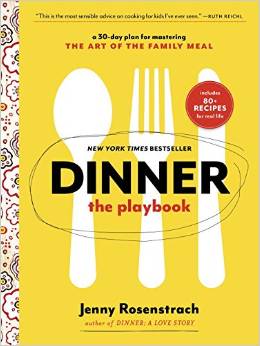 Dinner: The Playbook: a 30-day plan for mastering The Art of the Family Meal by Jenny Rosenstrach, Ballantine Books, 2014.
Dinner: The Playbook: a 30-day plan for mastering The Art of the Family Meal by Jenny Rosenstrach, Ballantine Books, 2014.
I talk in chapter 8 of my book (read it here) that one of my “small things” goals is to plan dinner ahead of time; that, while I’m good at entertaining and planning party food, we often rather limp along through the week’s normal family meals. (Although I am a killer breakfast maker, I must say.) Jenny Rosenstrach’s previous book, Dinner: A Love Story, is referenced there. I ran across that book at the library, liked it, and have visited her blog of the same name several times, which is how I found out about her new book. DALS is a lovely cookbook with many photographs of Jenny’s family; this book is more of a battle plan with recipes included. I have to say that I find most of her recipes to be rather weird and her meals a little on the skimpy side: spaghetti with shallots and Brussels sprouts? really? as the whole meal, not a side dish?
Behind the Scenes at the Stock Exchanges
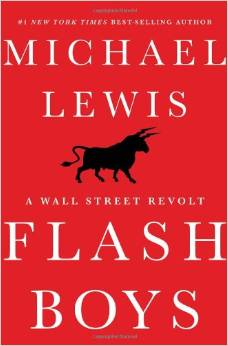
Flash Boys: A Wall Street Revolt by Michael Lewis, published by W. W. Norton, 2014. I got interested in this book because of an NPR story. (This type of thing happens frequently.) It’s fascinating to find out what’s really going on with something, especially an entity as supposedly public as public stock markets. Michael Lewis is known for writing about the story behind the story. Most people probably know about him from The Blind Side, which you really should read even if you’re not interested in football. He’s also written about baseball (Moneyball) and other aspects of the financial markets (Liar’s Poker and The Big Short). I’ve read all these other books except for Moneyball (but I saw the movie). |
“The Small Things that You Do Every Day . . .
 . . . matter more than the big things that you do once in awhile.” I write about this principle in the chapter on, surprisingly, “The Big Effect of Small Actions.” Read that sample chapter here in my book Intentional Happiness. The picture is a good illustration of this principle. It’s a shot of a plant called a “four o’clock,” something that gives you big return on a small investment, namely a seed. My mother used to grow these plants because she didn’t have much money. I’ve grown them several times but never liked the colors much. Last year I found a new variety, “Sunset Salmon,” from Park Seed, and they were just spectacular. We came home from our vacation to find them loaded with blossoms.
. . . matter more than the big things that you do once in awhile.” I write about this principle in the chapter on, surprisingly, “The Big Effect of Small Actions.” Read that sample chapter here in my book Intentional Happiness. The picture is a good illustration of this principle. It’s a shot of a plant called a “four o’clock,” something that gives you big return on a small investment, namely a seed. My mother used to grow these plants because she didn’t have much money. I’ve grown them several times but never liked the colors much. Last year I found a new variety, “Sunset Salmon,” from Park Seed, and they were just spectacular. We came home from our vacation to find them loaded with blossoms.A Great Shot in the Arm
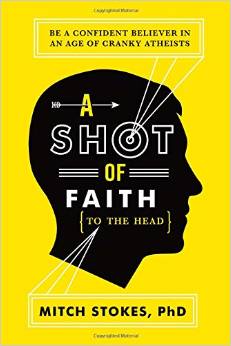 A Shot of Faith {To the Head}: Be a Confident Believer in an Age of Cranky Atheists
A Shot of Faith {To the Head}: Be a Confident Believer in an Age of Cranky Atheists
by Mitch Stokes, Ph.D., published by Thomas Nelson, 2012.
Dr. Stokes has had a double career that prepared him beautifully to write about the ideas in this book. In his earlier life he earned an M.S. in mechanical engineering and worked for an international firm where he earned five patents in gas turbine technology. Pretty impressive. But then he must have gotten bored or something, because he went off and earned an M.A. in religion at Yale and a Ph.D. in philosophy from Notre Dame. He is now a college senior fellow in philosophy. So, whatever you may think about his views, you can’t say that he doesn’t have the background to write about them.

